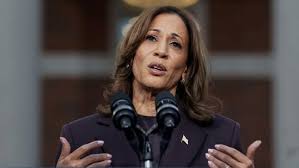Kamala Harris’ Campaign Explains Podcast Rejections and Missed Opportunities
The world of modern political campaigning is as much about digital media presence as it is about traditional rallies and debates. For Kamala Harris and her team, navigating media opportunities during her campaign involved strategic decisions and, at times, unexpected rejections. Recently, her team shared insights into why Harris didn’t appear on some of the most popular platforms, including the YouTube sensation Hot Ones and Joe Rogan’s The Joe Rogan Experience.

This behind-the-scenes look into Harris’ media outreach offers a glimpse into the complexities of campaign strategies and how media decisions can shape public perception.
Kamala Harris Turned Down by Hot Ones
Why Hot Ones Rejected Harris’ Campaign Request
During a debrief interview on Pod Save America, Harris’ campaign staff revealed that their request to feature Kamala Harris on the hit YouTube show Hot Ones was declined. For those unfamiliar, Hot Ones challenges celebrities to discuss various topics while eating chicken wings coated in increasingly spicy sauces.
According to Stephanie Cutter, a Harris campaign staffer, the rejection wasn’t personal. The show has a strict policy of avoiding political guests, which reportedly extended to all political figures, including Donald Trump. Cutter explained, “They didn’t want to delve into politics, so they weren’t going to take us or him.”
Why Harris Was a Perfect Fit for Hot Ones
Many believe that Harris’ charismatic personality and ability to connect with younger audiences would have made her an excellent guest for Hot Ones. Dan Pfeiffer, a host of Pod Save America, commented, “There never in time has there been a candidate better suited for a podcast than Kamala Harris on Hot Ones.”
Despite the rejection, the campaign’s willingness to embrace unconventional media platforms reflects their understanding of modern voter engagement.
The Joe Rogan Experience: What Really Happened?
Discussions with Joe Rogan’s Team
Joe Rogan, the host of one of the world’s most popular podcasts, expressed interest in featuring Kamala Harris on his show. However, the collaboration didn’t materialize due to scheduling conflicts and logistical challenges.
According to Cutter, Harris’ team was open to the idea and even proposed recording the podcast in Austin, Texas, during a campaign stop in nearby Houston. However, complications arose when they learned that Rogan was scheduled to interview Donald Trump on the same day.
Why the Opportunity Didn’t Work Out
David Plouffe, a senior advisor to Harris’ campaign, elaborated on the situation:
- The campaign offered to tape the podcast in Austin, but the timing didn’t align.
- Harris was unwilling to take time away from battleground states to accommodate the recording.
- Rogan’s team ultimately leveraged Harris’ availability to secure Trump’s appearance.
Despite the missed opportunity, Cutter emphasized that Harris was willing to engage in conversations with diverse audiences, saying, “She was ready, willing to go on Joe Rogan. So, we had discussions with Joe Rogan’s team. They were great… We just weren’t able to find a date.”
The Impact of Media Decisions on Campaigns
Would Appearing on Joe Rogan’s Podcast Have Helped Harris?
Joe Rogan’s audience, particularly younger men, represents a demographic where Harris struggled to gain traction. Cutter acknowledged that appearing on Rogan’s show could have been beneficial, not necessarily for the content of the discussion but for the symbolism of engaging with a wide-reaching platform.
“It would have broken through [the media clutter],” Cutter said. “Not because of the conversation with Joe Rogan, but because of the fact that she was doing it.”
Why Media Rejections Are Part of the Game
The Harris team’s experiences with Hot Ones and Rogan’s podcast highlight the challenges political candidates face in securing media appearances. These platforms often have their own priorities and restrictions, which don’t always align with campaign strategies.
The Bigger Picture: Harris’ Media Strategy
Leveraging Digital Media
Despite these setbacks, Harris’ campaign successfully utilized numerous other platforms to reach diverse audiences. Her willingness to engage with various media outlets reflects a modern approach to political campaigning.
A Lesson in Flexibility
The campaign’s adaptability and openness to unconventional opportunities underscore the evolving nature of political media strategies. As Cutter noted, “She was willing to do just about anything and have a conversation with anybody regardless of where they sat.”




